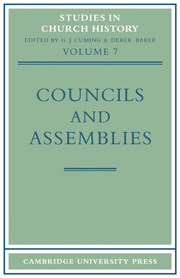Book contents
- Frontmatter
- Preface
- Contents
- Contributors
- Abbreviations
- Public welfare and social legislation in the early medieval councils (Presidential Address)
- National synods, kingship as office, and royal anointing: an early medieval syndrome
- The case of Berengar of Tours
- Ecclesiastica and Regalia: Papal investiture policy from the Council of Guastalla to the First Lateran Council, 1106–23
- Viri religiosi and the York election dispute
- Councils and synods in thirteenth-century Castile and Aragon
- The Byzantine reaction to the Second Council of Lyons, 1274
- The Council of London of 1342
- Education in English ecclesiastical legislation of the later Middle Ages
- The representation of the universitas fidelium in the councils of the conciliar period
- Nicholas Ryssheton and the Council of Pisa, 1409
- The condemnation of John Wyclif at the Council of Constance
- Some aspects of English representation at the Council of Basle
- The Council of Basle and the Second Vatican Council
- The Colloquies between Catholics and Protestants, 1539–41
- King James I's call for an ecumenical council
- John Hales and the Synod of Dort
- Assembly and Association in Dissent, 1689–1831
- The Convocation of 1710: an Anglican attempt at counter-revolution
- Laymen in synod: an aspect of the beginnings of synodical government in South Africa
- The First Vatican Council
- Kikuyu and Edinburgh: the interaction of attitudes to two conferences
The Colloquies between Catholics and Protestants, 1539–41
Published online by Cambridge University Press: 12 March 2010
- Frontmatter
- Preface
- Contents
- Contributors
- Abbreviations
- Public welfare and social legislation in the early medieval councils (Presidential Address)
- National synods, kingship as office, and royal anointing: an early medieval syndrome
- The case of Berengar of Tours
- Ecclesiastica and Regalia: Papal investiture policy from the Council of Guastalla to the First Lateran Council, 1106–23
- Viri religiosi and the York election dispute
- Councils and synods in thirteenth-century Castile and Aragon
- The Byzantine reaction to the Second Council of Lyons, 1274
- The Council of London of 1342
- Education in English ecclesiastical legislation of the later Middle Ages
- The representation of the universitas fidelium in the councils of the conciliar period
- Nicholas Ryssheton and the Council of Pisa, 1409
- The condemnation of John Wyclif at the Council of Constance
- Some aspects of English representation at the Council of Basle
- The Council of Basle and the Second Vatican Council
- The Colloquies between Catholics and Protestants, 1539–41
- King James I's call for an ecumenical council
- John Hales and the Synod of Dort
- Assembly and Association in Dissent, 1689–1831
- The Convocation of 1710: an Anglican attempt at counter-revolution
- Laymen in synod: an aspect of the beginnings of synodical government in South Africa
- The First Vatican Council
- Kikuyu and Edinburgh: the interaction of attitudes to two conferences
Summary
Ranke, whose judgments always deserve respect, said of the Colloquy of Regensburg:
If I am not mistaken this was a period of vital importance for Germany and even for the world. For Germany… [came] at last the possibility of reforming the ecclesiastical constitution of the nation, and, in relation to the Pope, of giving it a freer and more independent position, exempt from his temporal encroachments. The unity of the Church, and with it that of the nation, would have been maintained, and even more immense and enduring results would have emerged. If the moderate party, by whom these attempts began and were guided, could have maintained its ascendancy in Rome and in Italy, the Catholic world must have assumed a very different aspect.
While it is true that the ‘might-have-beens’ of history are unprofitable speculations, yet the possibilities behind that Colloquy of Regensburg have been too much neglected.
Has any Catholic scholar writing with authority spoken favourably and sympathetically of the Colloquies which took place between Catholics and Protestants in Germany in the period 1539–41? From John Eck who took part in them down to Dr Hubert Jedin, author of the magisterial history of the Council of Trent, as far as I am aware, the Colloquies have been dismissed as ill-grounded and irresponsible attempts at reconciling Catholic truth with heresy by unauthorized means—a movement bound to fail because it was undertaken by the wrong people, with the wrong methods, and with wrong ends in view.
- Type
- Chapter
- Information
- Councils and Assemblies , pp. 235 - 266Publisher: Cambridge University PressPrint publication year: 1970



